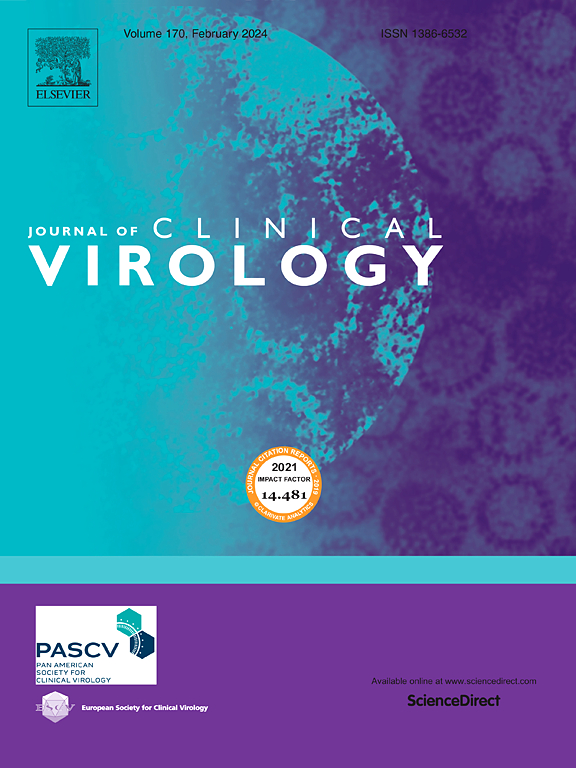Impact of metformin on HBV replication: No evidence of suppression in vitro
IF 3.4
3区 医学
Q2 VIROLOGY
引用次数: 0
Abstract
Background
Outcomes of chronic Hepatitis B (CHB) infection have been increasingly associated with various metabolic syndromes, including metabolic-dysfunction associated steatotic liver disease (MASLD), with a potential for impact on liver disease progression. There is some evidence that metformin, a widely used anti-diabetic drug, may reduce hepatocellular carcinoma (HCC) incidence in people living with Hepatitis B Virus (HBV), but with little to no evidence of impact on the virus itself in vivo. However, previous in vitro studies suggest metformin may have a direct impact on HBV replication, although the mechanism remains unclear.
Objectives
We aimed to investigate the impact of metformin on HBV replication in vitro.
Study design
Hepatocyte cell lines constitutively expressing HBV (HepAD38) were treated once or thrice with escalating doses of metformin, using lamivudine and water as controls. We monitored cellular cytotoxicity as well as HBV biomarkers (HBeAg, HBsAg, HBV DNA and RNA) throughout the assay.
Results
We did not observe any impact of metformin on HBV replication after a single dose or three repeated treatments.
Conclusions
In HepAD38 cells, HBV replication is not impacted by metformin treatment. This contrasts with prior in vitro data but is in line with clinical evidence that suggests metformin acts through an influence on liver disease progression rather than a direct antiviral impact on HBV itself.
二甲双胍对HBV复制的影响:体外无抑制证据
慢性乙型肝炎(CHB)感染的结局越来越多地与各种代谢综合征相关,包括代谢功能障碍相关的脂肪变性肝病(MASLD),并有可能影响肝脏疾病的进展。一些证据表明,广泛使用的降糖药二甲双胍可能降低乙型肝炎病毒(HBV)感染者的肝细胞癌(HCC)发病率,但几乎没有证据表明对体内病毒本身有影响。然而,先前的体外研究表明,二甲双胍可能对HBV复制有直接影响,尽管其机制尚不清楚。目的探讨二甲双胍对HBV体外复制的影响。研究设计肝细胞细胞系组成表达HBV (HepAD38)用一次或三次递增剂量的二甲双胍治疗,使用拉米夫定和水作为对照。我们在整个试验过程中监测细胞毒性以及HBV生物标志物(HBeAg, HBsAg, HBV DNA和RNA)。结果我们没有观察到二甲双胍在单次或三次重复治疗后对HBV复制的任何影响。结论在HepAD38细胞中,二甲双胍治疗不影响HBV复制。这与先前的体外数据形成对比,但与临床证据一致,表明二甲双胍通过影响肝脏疾病进展而不是直接对HBV本身产生抗病毒作用。
本文章由计算机程序翻译,如有差异,请以英文原文为准。
求助全文
约1分钟内获得全文
求助全文
来源期刊

Journal of Clinical Virology
医学-病毒学
CiteScore
22.70
自引率
1.10%
发文量
149
审稿时长
24 days
期刊介绍:
The Journal of Clinical Virology, an esteemed international publication, serves as the official journal for both the Pan American Society for Clinical Virology and The European Society for Clinical Virology. Dedicated to advancing the understanding of human virology in clinical settings, the Journal of Clinical Virology focuses on disseminating research papers and reviews pertaining to the clinical aspects of virology. Its scope encompasses articles discussing diagnostic methodologies and virus-induced clinical conditions, with an emphasis on practicality and relevance to clinical practice.
The journal publishes on topics that include:
• new diagnostic technologies
• nucleic acid amplification and serologic testing
• targeted and metagenomic next-generation sequencing
• emerging pandemic viral threats
• respiratory viruses
• transplant viruses
• chronic viral infections
• cancer-associated viruses
• gastrointestinal viruses
• central nervous system viruses
• one health (excludes animal health)
 求助内容:
求助内容: 应助结果提醒方式:
应助结果提醒方式:


